Economic Depression: Causes and Consequences
Understanding Economic Depression: Causes and Consequences
Economic depressions are severe and prolonged downturns in economic activity. Unlike typical recessions, which might last for a few months, depressions can extend for years, deeply impacting nations and their citizens. Understanding the causes and consequences of economic depression can help governments and policymakers undertake preventive measures.

Causes of Economic Depression
The causes of economic depressions are varied and complex. One of the primary triggers is a severe financial crisis. When major financial institutions fail or experience severe distress, it can lead to a reduction in consumer confidence and spending, exacerbating the economic situation.
Another cause can be a substantial decrease in consumer demand. When consumers reduce their spending, businesses see a decline in revenue, which can lead to layoffs and further reduce consumer purchasing power. This vicious cycle is difficult to break without substantial intervention.
External shocks, such as natural disasters or geopolitical events, can also precipitate a depression. These events disrupt supply chains, damage infrastructure, and create uncertainty in global markets.
The Role of Government Policies
Government policies play a crucial role in either mitigating or exacerbating an economic depression. Poor fiscal policies, such as excessive taxation or inadequate public spending, can worsen economic conditions. Conversely, strategic government intervention can help stabilize the economy.
Monetary policy is another critical factor. Central banks may need to lower interest rates or engage in quantitative easing to encourage borrowing and investment. However, these measures must be carefully managed to avoid long-term negative effects such as inflation.
Consequences of Economic Depression
The consequences of an economic depression are far-reaching. One of the most immediate impacts is a significant rise in unemployment rates. As businesses close or downsize, many people lose their jobs, leading to increased poverty and hardship.
Economic depressions also result in decreased production and business failures. The reduction in industrial output leads to a decline in GDP, further exacerbating the economic situation. This decline impacts not only individual businesses but also entire industries.
Long-term Societal Impacts
Beyond the immediate economic effects, depressions have long-term societal impacts. Increased poverty and unemployment can lead to social unrest and political instability. As people struggle to meet their basic needs, social tensions rise.
The psychological impact on individuals and communities is also significant. The stress and uncertainty associated with economic depressions can lead to mental health issues, affecting overall wellbeing and societal cohesion.

Recovery and Prevention
Recovering from an economic depression requires coordinated efforts from governments, businesses, and communities. Implementing effective fiscal and monetary policies is essential to stimulate economic growth and restore confidence among consumers and investors.
Preventive measures are equally important. Strengthening financial regulations, diversifying economies, and investing in infrastructure can help create resilience against future downturns. Education and job training programs can also prepare the workforce for evolving economic conditions.
Ultimately, understanding the causes and consequences of economic depression is crucial for building a more robust and stable global economy. By learning from past experiences, societies can better prepare for future challenges and work towards sustainable prosperity.
